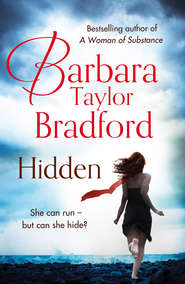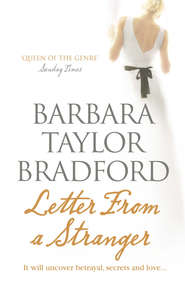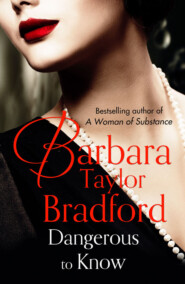По всем вопросам обращайтесь на: info@litportal.ru
(©) 2003-2025.
✖
A Woman of Substance
Настройки чтения
Размер шрифта
Высота строк
Поля
She opened her eyes and began to stroke the woman’s feverish brow gently. ‘Mam! Mam! Can yer hear me? Are yer all right?’ she asked again in a voice quavering with dread. There was still no visible response.
In the wavering light from the tiny candle flame the woman’s face was clearly in focus. Usually pale, it had taken on an ashen cast and beads of sweat coated it with a glistening film that looked ghastly in the weak light. The once luxuriant brown hair fell in limp and listless fronds across the damp brow and lay in a tangled mass on the sodden pillow behind her. There was a sweetness in the face, which the pain and suffering had not completely obliterated, but all the traces of the gentle beauty of her youth had been dissipated by the ravages of grim poverty, by the years of punishing struggle for survival, and finally by this deadly and virulent sickness. An aureole of death was around Elizabeth Harte and she would not live to see these last few months of winter move forward into spring. She was suffering from the wasting disease which was consuming her little by little every day, leaving her a withered and wraith-like old woman. She was not quite thirty-four years old.
Hers was a grim sickroom, for it contained few elements of comfort or beauty, none of the amenities of life. The bed was the dominant piece of furniture and it took up most of the space under the sloping eaves. Apart from the bed there were few scant furnishings. The rickety table, made of bamboo, was wedged in the corner, between the bed and the small window, and upon this reposed a worn black Bible, a pottery mug, and the medicine Dr Malcolm had prescribed. Near the door there was a crude wooden chest, whilst the mahogany washstand, with its cracked white marble top, rested against the wall on the far side of the window. The cottage was built into the side of the moorland and this made it cruelly damp and unhealthy through all the seasons of the year, but especially so in these harsh northern winters when rain-soaked gales and driving snow blew ferociously across the fells. Yet in spite of the dampness, the spartan frugality, and the dreary ambiance, the room was spotlessly clean. Freshly washed and starched cotton curtains hung at the window, and the few pieces of rustic furniture gleamed brightly with beeswax and Emma’s constant care. Not a speck of dust marred the worn wooden floor, which was covered in part with clipped rugs, homemade from pieces of gaily coloured rags hooked into sacking. Only the bed was unkempt and neglected, for Emma could change the bed linen but once a week, when she came home from Fairley Hall, where she was in service.
Elizabeth moved uneasily and with some agitation. ‘Is that our Emma?’ The voice was so feeble with fatigue it was barely audible.
‘Yes, Mam, it’s me,’ the girl cried, clutching her mother’s hand.
‘What time is it, Emma?’
‘Just turned four o’clock. Old Willy knocked us up early this morning. I’m sorry if I waked yer, Mam, but I wanted ter make sure yer were all right, afore I went up yonder ter the Hall.’
Elizabeth sighed. ‘Aye, lass. I’m not so badly. Don’t fret so. I’ll get up later and—’ She began to cough violently and pressed her fragile hands to her chest trying to contain the tremors that shook her. Emma poured medicine into the pot mug on the table and, slipping her arms around her mother, she propped her up so that she could drink from the pot. ‘Try this, Mam. It’s the stuff from Dr Mac, and it seems ter do yer good,’ she exclaimed, in the most cheerful voice she could summon. Elizabeth attempted to sip from the pot between bouts of the persistent coughing that racked her body. Slowly the obstinate rattle in her chest abated and eventually she was able to take a long draught of the medicine. Although she was suffering from shortness of breath and exertion she managed to speak.
‘Yer’d best go down and see ter yer father and the lads, luv. I’ll rest a while and perhaps afore yer go ter work yer’ll bring me up some tea.’ The febrile light in her eyes was dimming and she seemed more conscious of her surroundings, more aware of the girl who stood beside the bed.
Emma bent down and kissed the woman’s lined cheek with tenderness and pulled the blankets up around the wasted shoulders protectively. ‘Aye, I will.’ She slipped out of the room and closed the door softly. As she ran down the narrow stone staircase, ignoring its high perilous slant in her haste, raised voices wafted up to meet her halfway. Emma stood quite still and drew in her breath sharply, her heart sinking into the pit of her stomach. A feeling of nausea swept over her as she envisioned the ugly scene awaiting her. Winston, her brother, and her father were quarrelling again and the violence of their confrontation was only too evident from their angrily raised voices. The chilling thought that they would disturb her mother caused Emma to cry out involuntarily. She stifled the frightened half cry, pressing her roughened hands to her mouth, and sat down heavily on the cold stone steps, wondering helplessly how she could stop them fighting. If her mam heard them she would crawl out of bed to make peace between them, even if it took her last ounce of strength. Elizabeth Harte had always been the buffer between her son Winston and her husband. In these last few weeks she had been too debilitated to leave her bed, a virtual prisoner in the mean little room under the eaves. But when she heard their violent disagreements, she cried a lot and the fever accelerated and became more virulent and she coughed until she was worn out with coughing.
‘Fools!’ Emma said out loud. Grown men acting like bairns and them too selfish ter think of me poor mam. This thought galvanized her. She jumped up quickly, the sinking sickness replaced by a cold anger that grew in magnitude as Emma continued her descent down the staircase. She pushed open the kitchen door and stood rigid and tense on the threshold, her hand tightly gripping the doorframe. As she regarded the scene her green eyes took on a flinty look.
Unlike the damp and cheerless room upstairs, this was a cosy, heartwarming place. A fire blazed in the grate and a large iron kettle was hissing on the hob. The giant-sized cabbage roses on the wallpaper had long since lost their summer glory, but the smudged pink outlines left behind added a warming mellow cast to the walls. Pieces of polished horse brass gleamed around the fireplace, twinkling in the soft light with the lustre of freshly minted gold sovereigns. Two comfortable high-backed wooden chairs stood on either side of the fireplace and there was a tall Welsh dresser opposite, filled with blue and white willow-patterned dishes. In the very centre of the room, a large scrubbed wood table took pride of place and was surrounded by six rush-seated chairs. White lace curtains graced the windows and the red brick floor sparkled. The room had a robust, rosy glow, a glow enhanced by the roaring fire that blazed up the chimney and the trembling flicker of the paraffin lamp that stood on the mantelshelf.
It was a scene that Emma carried with her, especially when she was at Fairley Hall, for it engendered a sense of well-being within her and comforted her when she was alone. Now her cherished image was shattered. Everything was in its place, nothing had been moved, but the atmosphere was charged, and ugly and angry words reverberated and bounced off the walls. The two men, her father and her brother, faced each other like animals, oblivious to her, oblivious to everything except this deadly hatred between them.
John ‘Big Jack’ Harte was a large man, as his nickname implied. Without his boots, in his stocking feet, he stood six foot two and was ramrod straight. He had fought the Boers in Africa in 1900, a sergeant in the Seaforth Highlanders, and it was said of him that he could fell a man with one blow from his massive fist. He had a powerfully built frame, a handsome roughhewn face, a ruddy complexion, and a splendid head of wavy hair the colour of polished jet.
He stood towering over his son Winston, his fist raised in anger and ready to bring down hard on the boy. His face was livid with volcanic wrath and his eyes flared dangerously. ‘Thee’s not going into no navy and that’s last I’ll hear of it in this house, me lad! Thee’s under age and no permission will thee get from me. Now drop it once and for all, our Winston, or thee’ll feel me strap across thee back. Thee’s not too old yet for a good hiding, me lad, and don’t thee forget it!’
Winston glowered back at his father, his unusually beautiful face flushed and contorted with frustration and anger, his blue eyes icy. ‘If I want ter go, I’ll go,’ he screamed passionately. ‘Yer can’t stop me if I runs away and run away I will, out of this godforsaken hole, here there’s nowt but misery and poverty and dying—’
‘Little monkey! Talk back ter me, would thee! We’ll soon see about that!’
The boy could not move for a split second and then, as the bubble of rage burst in his head, he stepped forward and lifted his arm as if to strike his father. But through the dizzying haze of his blinding anger he saw something menacing in those eyes and he paled and backed away, faltering, mortally afraid of his father’s strength. Although he was not as tall and as muscular as his father, Winston was well built and strong, but he was made of finer stuff, more like his mother. And he knew he was no physical match for Big Jack Harte. Winston had strong instincts for self-preservation and especially so when it applied to his person, for the fifteen-year-old boy was increasingly conscious of his striking looks and he knew them to be his most powerful asset.
‘Don’t think I didn’t see that, our Winston! I’ll teach thee ter raise thee hand ter me, lad! That I will. I’m going ter give thee a good hiding thee won’t forget as long as thee lives. And it’s long overdue!’ As he spoke he began to unbuckle the black leather belt around his trousers, pulling it off hurriedly in his excitement. He wrapped it around his right hand, buckle first, moving towards Winston threateningly and with immense power.
‘Ah, yer can’t scare me!’ Winston cried shrilly, nonetheless retreating to the Welsh dresser, putting the table safely between them. ‘Yer wouldn’t dare hit me! Me mam won’t never forgive yer, if yer puts that strap on me!’ he warned.
Big Jack Harte appeared not to hear. He moved forward rapidly and with agility, the black leather strap dangling ominously in his tightened fist. He lifted his arm and would have brought the strap down across the boy’s head if Emma had not rushed across the room at this moment and jumped in front of her father. She grabbed his arm and held it with both hands, using all of her strength. Her face was gaunt in the firelight and she shook with rage. She stood before her father unflinchingly. She was the only one who dared defy him, who had the nerve to stand up to him. And she could usually quell his wrath, subdue him into docility.
Although her voice was quiet when she spoke there was vehemence in her words. ‘Shut up, Dad! What’s got in ter yer? Shouting and bawling at this hour and our mam lying badly upstairs. Yer should know better, our dad. And yer should be ashamed of yerself! Now sit down and drink yer tea, or I’ll be the one that runs away, and then where would yer all be, eh?’ She held tightly on to his raised arm, which she could not move. ‘Come on, Dad,’ she cajoled in a softer tone, ‘don’t be stubborn. Our Winston won’t run off ter the navy. That’s all big talk on his part.’
‘That’s what yer think, is it, Miss Nosy Parker?’ Winston interjected furiously from the safety of his corner on the other side of the room. ‘Well, yer wrong for once in yer short life, our Emma. I mean it. Yes, I do.’
Emma swung around to face her brother. She strove to control herself. ‘Stop it, Winston,’ she hissed. ‘Yer’ll have me mam downstairs next and her so poorly. And stop this stupid talk of joining the Royal Navy. Me dad’s right, yer are too young. And yer’ll break our mam’s heart if yer runs away. So stop it. And now!’
Winston’s eyes gleamed with unfamiliar resentment and hostility. ‘Miss Bossy Knickers, that’s what yer are,’ he cried derisively. ‘Mind yer own business, Miss Bossy. Always interfering. Yer make me sick. Yer nowt but a slip of a lass and what do yer knows about owt, Emma Harte!’ There was a tinge of venom in his voice, but he recoiled under her piercing gaze, which was full of coldness. Her expression was one of indifference as she turned her back on him with deliberateness. Winston was vaguely conscious that he was afraid of his sister. Not afraid in the sense that he was afraid of his father’s brute force, but in another, wholly different way which he did not fully comprehend. As if to belie his feelings, he sucked in his breath and cried, ‘Too big for yer boots, Emma Harte. That’s what yer are!’ Emma ignored this last outburst and pressed her lips together, willing herself not to respond.
Jack had been dimly aware of this heated exchange between his two eldest children and he had used the few seconds to cool his rage. Now he turned his leonine head slowly and regarded his son with penetrating intensity. ‘Enough’s enough, Winston,’ he said in a voice still roughened with the residue of anger, yet controlled. ‘Leave thee sister alone. Thee’s done plenty of damage for one day, and I won’t be forgetting it for a hell of a long time.’
‘She’s always poking her nose inter me business—’ Winston retorted, but stopped short when he saw the irate glint in his father’s eyes, the flush rising on his neck to suffuse his face. Jack moved restlessly under Emma’s loosening grip and Winston thought better of arousing his father again. He slid with catlike grace to the far end of the kitchen, towards their younger brother Frank, who had been cowering against the set pot shaking with fear and whimpering during the uproar.
Emma was seething at his stupidity and inability to gauge their father’s moods, to know when to hold his tongue. Watching him whispering to Frank and consoling him, she wished he would run away and then perhaps they would have some peace. This disloyal thought so paralysed her she let go of her father’s arm. Winston’s presence had always been necessary to her and they were inseparable. He was her ally, her only friend, and as such she had considered him to be indispensable. The realization that perhaps he was not stunned her. She turned back quickly to her father, took his arm, and, somewhat shaken, said quietly, ‘Come on, Dad, sit down now.’
For a moment Jack Harte would not yield under the determined but light pressure of her hands on his muscular body. He looked down at the girl and thought how thin she was and he knew how easy it would be to free himself from her grip. With a flick of his wrist he could send her frail body hurtling across the room. But he had never struck Emma and he never would. He relaxed and allowed her to manoeuvre him into the chair. He gazed at the pale face, usually so grave and thoughtful, which still slightly twitched with aggravation, and he was moved as only she, of all his children, could move him. And as he contemplated his daughter, the only one who dared to challenge him, Big Jack had a rare and sudden flash of insight. He recognized with great clarity of vision that he was facing implacable will. A will wrought of iron and, in one so young, frightening and shocking. That unyielding little countenance filled him with a mixture of emotions, new emotions for him, compounded of pride and fear. He was proud of Emma’s strength, yet afraid for her because of it. It would get her into trouble one day, of that he felt sure. She was independent of spirit and there was no room for independent spirits in their world. Their class was inevitably ground under the heels of the bosses. Emma’s fierce will would be broken and he dreaded that day. He prayed then that he would not be around to see it, for it would break his heart, just as surely as it would break hers.
As he continued to stare at her, he saw the girl clearly for the first time in years. He saw the undernourished body, the thin neck, and the scrawny shoulders underneath the shabby little nightgown. But he also saw something else. He saw the transparency of the skin, as white as the snow that lingered still on the highest fells. He saw the sparkling eyes full of emerald fire, twin reflections of his own. He saw the richness of the russet hair that came to a widow’s peak above the proud brow. He saw in that undeveloped childish body the beginning of prettiness, but would it ever come to flower? His heart shifted and seemed to move imperceptibly with an unbearable ache and he was filled with profound anger and grief when he thought of the life of drudgery that lay ahead of her. She was a drudge already, here and at Fairley Hall, and she was so young.
Her light, girlish voice brought him out of his reverie. ‘Dad, Dad, don’t yer feel well?’ She was bending over him.
‘There’s nowt wrong with me, lass. Have thee looked in on thee mam? How is she?’
‘She was a bit poorly afore I came down, but she’s resting easy like now. I’m going ter take her some tea in a minute.’
She started to move away from him and he smiled at her, white teeth flashing, eyes loving, but she did not respond in her usual affectionate way, the way he had anticipated. She simply patted his arm and gave him a long careful look and he felt curiously reproached and shamed by his own child, as if he were the child and she the parent. And it bothered him enormously, for Emma was his favourite and he understood her and had the most profound love for her. He did not want to be diminished in her eyes. Her esteem was very necessary to him. Mechanically he leaned over and lifted his boots from the hearth. It was getting late and he would have to leave soon for the Fairley brickyard, where he and Winston worked. It was on the Pudsey road and it took them a full hour to walk there.
Emma crossed the kitchen with a burst of energy and renewed purpose. She wanted to dispel the mood, return things to normal, for although their thoughtlessness still rankled, she was not one to bear a grudge for long. She spied Frank at the set pot. He was calm again and with great concentration was preparing the sandwiches for their lunch and tea breaks, which they took to work with them in their jock boxes. She hurried over to join him, rolling up her sleeves purposefully, the air crackling with her vitality.
‘Frank, lad, whatever do yer think yer doing!’ she cried when she reached the boy, her eyes widening in surprise, her head bobbing from side to side in her excitement. ‘Lathering that dripping on like there’s no termorrow!’ She grabbed the knife from the startled boy’s hand and, clucking in mild irritation, she began to scrape some of the dripping off the bread. These scrapings she thriftily returned to the brown stone jar that stood on the wooden chopping board which covered the set pot opening. ‘We’re not gentry yet, our Frank,’ she went on, and expertly finished making the sandwiches herself, folding the bread cakes over and cutting them in half decisively and with a little flourish.
Frank shrank from Emma, his lower lip trembling, his hazel eyes brimming with hot tears, his small face pinched and scared. Frank was twelve and small for his age. He had a head of fair hair as soft as duck’s down, a milky skin, and a gentle face, almost girlish in its prettiness. Much to his humiliation, his sweet appearance had earned him the nicknames of ‘Sissy’ and ‘Nancy’ at the Fairley mill, where he worked as a bobbin ligger. Under Winston’s expert tuition he had learned to fight back with his fists, but his preference was to walk away from the taunts and jibes, his head held high, ignoring them. And that was the way he would be all of his life, always sensitive and thin-skinned, but capable of turning the other cheek, proudly and with disdain.
His fair hair fell over his eyes and he pushed it away nervously, turning pathetically to Winston, his defender, who had just finished washing at the sink. ‘I didn’t mean no harm, Winston,’ he said, and the tears slid down his freckled cheeks.
Winston had witnessed this scene at first with astonishment and then with amusement, aware that Emma’s brisk manner was her way of reasserting her motherly authority over them, and also of restoring their usual morning routine. He knew that her clucking and spluttering about the dripping was harmless. He put down the towel he had been using and pulled the younger boy to him, holding him comfortingly in the crook of his arm.
‘Well, I’ll go ter hell and back!’ he exclaimed, feigning horror, as he addressed his father. He bit his lip to hide a smile and continued, ‘I never thought I’d live ter see the day our Emma turned inter a nip scrape. I think some of old man Fairley’s habits have rubbed off on yon lass.’ He spoke mildly, all the hostility washed out of his eyes.
Emma whirled on them, her face flushed in the firelight that blazed up the chimney and filled her hair full of golden lights. She brandished the knife before her. ‘That’s not fair! I’m not a nip scrape! Am I, Dad?’ she appealed, and rushed on breathlessly before he could answer, ‘Anyway, old man Fairley’s that well off he’s bowlegged with brass and do yer know why? Because he wouldn’t nip a currant in two and give yer half. So there!’ She spoke heatedly, although not with anger, and there was an embarrassed expression on her crimson face. Winston knew his teasing had hit its mark, for Emma loathed stinginess and it was the worst accusation anyone could level at her, even in jest.
Bridling and tossing her head, she said huffily, ‘That dripping was two inches thick. Yer couldn’t have eaten them sandwiches. Yer would’ve been sick, that yer would.’
Winston started to laugh, unable to suppress his amusement any longer. Jack threw him a startled glance, his thick black brows puckering together in a jagged line across his brow as he gazed at the boy mystified. But he saw at once that Winston’s laughter was not malicious and he saw, too, Emma’s increasing confusion and humiliation. As he looked from one to the other the boy’s mirth infected him. He chuckled and slapped his knee.
Emma glared at them and slowly a sheepish grin spread itself across her face. She was laughing herself. ‘What a fuss over a ha’porth of dripping,’ she muttered through her laughter, shaking her head as she put down the knife. Frank looked in bewilderment at them all, at first uncomprehending, and as he realized their merriment was real he laughed, too, wiping away his tears on the sleeve of his grey shirt. Emma hugged him to her. ‘Don’t take on so, Frank luv. I meant no harm, yer silly duck nut. And don’t wipe yer nose on yer sleeve,’ she scolded gruffly as she stroked back his hair and kissed the top of his head with tenderness.
A feeling of friendliness and genuine family affection was miraculously restored. Emma sighed with relief and began her managerial bustling again. ‘We’ll all have ter look sharp and get a move on, or we’ll be late for work,’ she cried, catching sight of the clock on the mantel. It had just turned a quarter to five and her father and Winston had to leave at five o’clock to reach the brickyard by six, when they had to clock in. She felt the teapot under the cosy. The pot was still hot. ‘Come on, Frank, take this tea up ter our mam for me,’ she said, pouring tea into a mug and adding generous portions of milk and sugar. ‘And, Dad, mend the fire for me, will yer, please. Bank it up so that it lasts till me Aunt Lily comes in. And, Winston, wash the pots whilst I finish making yer jock. And, Dad, don’t forget the fireguard.’
She handed the mug of tea to Frank. ‘And ask me mam if she wants some bread and jam, and hurry up about it, me lad, there’s still a lot of chores ter be done afore I go ter the Hall.’ Frank took the tea carefully in both of his small hands and hurried across the room, his boots ringing hollowly on the brick floor as he headed for the staircase. Whistling under his breath, Winston gathered the dirty mugs and plates from the table and carried them over to the sink, whilst Jack turned to the fireplace and began stacking on the logs. Emma smiled to herself. Peace was restored. She moved to the set pot and began to wrap the sandwiches in the cotton serviettes her mother had so carefully hemmed, dampening them first so that the sandwiches would stay fresh.
Jack devoted his attention to the fire, interspersing the logs with treasured pieces of coal and then heaping on coal dust so that the fire would last until his sister Lily came in to tend to Elizabeth later in the morning. As he swung his great body around to reach for the fireguard he glanced surreptitiously at Winston, who was mechanically washing the pots at the kitchen sink. He regretted his outburst of anger earlier. There was no deep-rooted hatred between them, only this irritation that was increasingly difficult to repress in them both. He did not even blame the boy for wanting to leave Fairley; nevertheless, he could not permit him to go. Dr Malcolm had said nothing specific about Elizabeth’s health, but Jack did not require a medical opinion to confirm what he already suspected. She was dying. Winston’s departure at this time would be the last nail in her coffin. He was her favourite child. She loved all of her children, but Winston was special, being the eldest and so like her in looks. Jack dare not let him leave and yet he could not tell the boy his reasons. ‘And he always picks the wrong time ter discuss it,’ Jack muttered to himself as he put the fireguard around the grate. He rested for a moment against the guard, staring into the fire, blinded by searing grief and overwhelming despair. It was grief for Elizabeth, who had been so brutalized by life, despair for his young children, who would be motherless before the last of the snows melted into spring.
He felt a light touch on his arm and he knew it was Emma. He swallowed hard, his throat constricted. He coughed hoarsely and straightened himself to his full height, attempting a smile. ‘Yes, luv, what is it?’
‘Yer’ll be late, Dad. Yer best go and see me mam now, afore yer leave.’
‘Aye, lass. I’ll just wash this coal dust off me hands.’ Jack moved to the sink, where Winston was drying the pots. ‘Go up and see thee mam, lad, and I’ll be up in a minute. Thee knows how upset she gets if we don’t all see her afore we leaves.’ Winston nodded, wiped the last of the mugs quickly, and left the kitchen, still nervously whistling between his teeth.











